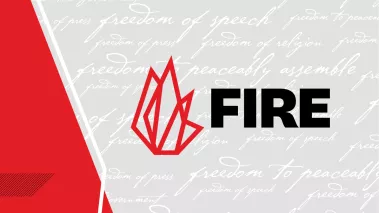Table of Contents
$10 Million Lawsuit Alleges Violation of Free Speech

Shock jock Jason Antebi, a student at Occidental College, filed a $10 million civil suit against Occidental in March, alleging that his free speech rights were violated and his reputation tarnished last year when he was removed from his student radio show and subjected to discipline. Antebi claims he should have been allowed to continue to broadcast “Rant and Rave” on student radio station KOXY, and that student complaints about the show that triggered the discipline were politically motivated—the result of his actions as vice president for policy for Associated Students of Occidental College.
The Northridge resident, who graduated last May with a B.A. in politics, claims that he was defamed by College officials, affecting his ability to attend graduate school, damaging his job prospects, and injuring his health to the extent that some permanent disability will result. The actions of the College “were so outrageous and extreme as to exceed all bounds of what is tolerated in a civilized society,” the lawsuit says.
Because federal and state privacy laws bar colleges from revealing anything about student disciplinary proceedings, Occidental can say little about the lawsuit—particularly because it claims Antebi’s right to privacy as a student was violated, says Jim Tranquada, director of communications (one of six individuals named as defendants, together with the College and the Board of Trustees). Even after a lawsuit has been filed, a college cannot discuss disciplinary proceedings outside of court filings, Tranquada adds.
In the lawsuit, Antebi calls “Rant and Rave” a political parody show that relied on provocative humor and satire. On one broadcast last year, this included calling random East Coast convenience stores to try to get employees to say ‘Tampax,” “Trojan lubricated condoms,” and “syphilis,” and referring to his mother as a “whore” and “stupid bitch.”
“We believe the issue is whether the College is required to provide a forum for students to broadcast this kind of material,” says Sandra Cooper, College counsel and vice president for legal affairs (who also is a defendant in the case).
The US Supreme Court has distinguished between the need to tolerate certain speech, and whether schools are required to promote or endorse another’s speech, Cooper says. As the u.s. Ninth Circuit Court of Appeals noted in a 2000 case that was unsuccessfully appealed to the Supreme Court, schools “retain the authority to refuse to sponsor student speech that might reasonably be perceived to advocate drug or alcohol use, irresponsible sex, or conduct otherwise inconsistent with the shared values of a civilized order.”
Recent Articles
FIRE’s award-winning Newsdesk covers the free speech news you need to stay informed.

Victory in Virginia! Gov. Youngkin defends free speech by vetoing bill on ‘altered’ political media

DEI statements could function as ideological firewalls, new study finds

Is it ‘hate speech’ to say Jesus needs a haircut?
